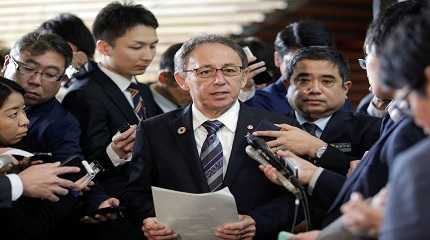
TOKYO, Sept 11 (Reuters) - Voters in Japan's Okinawa re-elected Denny Tamaki as governor on Sunday, public broadcaster NHK and other media said, backing an independent candidate who wants a smaller U.S. military footprint on the chain of islands near Taiwan.
The anticipated re-election of Tamaki, who was supported by a coalition of opposition parties, is a sign of pushback against Prime Minister Fumio Kishida's ruling party, which has been hit by scandal over members' ties to the Unification Church.
Okinawa prefecture is far closer to Taiwan than to Tokyo, putting it front and centre to growing tension in the region.
China this summer launched five missiles into the sea close to Okinawa, and within Japan's exclusive economic zone, during military exercises after U.S. House Speaker Nancy Pelosi visited Taiwan, which Beijing claims as its own.
NHK and other Japanese media declared Tamaki the winner, citing exit polls. Official results are expected overnight.
The son of a U.S. Marine and a Japanese mother, Tamaki was first elected as governor four years ago when he campaigned against U.S. military presence. This time, he focused more on the economy, after the pandemic battered Okinawa's tourism industry.
He told cheering supporters that he would continue to work to bolster the social safety net for the poor, although he did not skirt the contentious issue of U.S. military bases.
"I have not wavered one millimetre, nor will I, in my efforts to resolve the base issue and I will continue to share my thoughts with the people of the prefecture and seek a solution from the government," he said.
His victory is likely to be seen as a setback for Kishida's ruling Liberal Democratic Party, which has seen approval ratings slide over revelations about the long-running links between some lawmakers and the Unification Church, which critics call a cult.
Kishida has apologised for his party's ties to the church and vowed to win back public trust by severing them. The backlash has also fanned public opposition to a planned state funeral for slain former premier Shinzo Abe, who delivered a speech at an event hosted by a church affiliate last year.
"The governor's re-election was expected, but the issues at stake were not only bases," said Hiroshi Shiratori, a professor of political science at Hosei University in Tokyo. He said Abe's funeral and the Unification Church scandal also played a role. "They also had an impact."
Kishida's ruling (LDP) has pushed for increased defence spending to counter Beijing and backed former local mayor Atsushi Sakima. Tamaki defeated Sakima in 2018, partly by calling for the large Futenma U.S. air base to be moved outside the prefecture.
Okinawa saw some of the bloodiest fighting in World War Two and has long resented the burden of hosting the majority of U.S. troops in Japan on facilities that take up 5% of its land.




